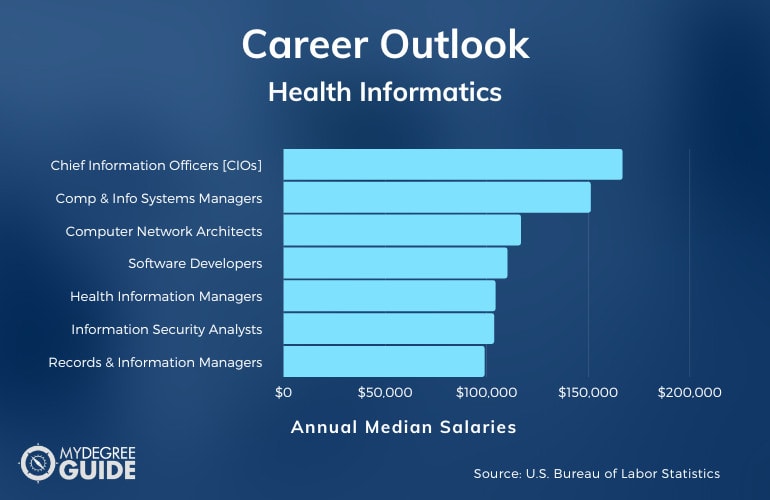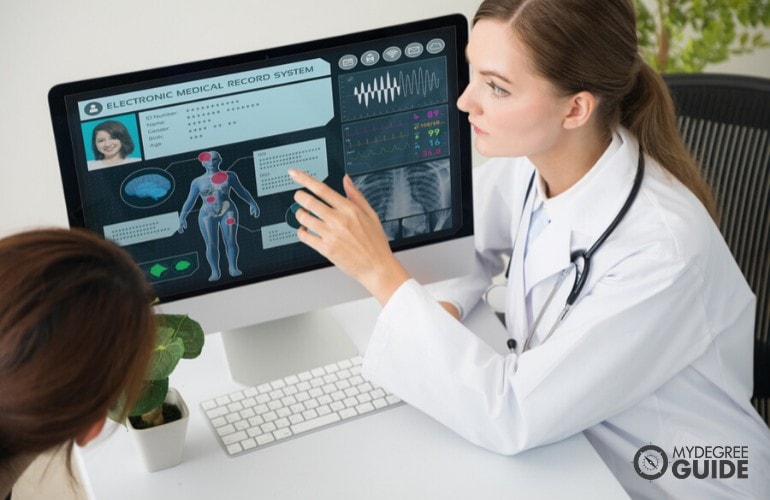Explore Online Masters in Health Informatics Programs for 2024. Compare master’s programs, universities, career options, and salaries.

As digital technology’s role in healthcare has grown, online Masters in Health Informatics degrees have become increasingly important.
Editorial Listing ShortCode:
Getting this degree can help prepare you for leadership roles in medical settings. Your knowledge of technology can help contribute to excellent patient care.
Online Masters in Health Informatics Degrees

Healthcare facilities use technology to manage patient data and improve the quality of care. To play a critical role in modern healthcare organizations, consider entering the field of Health Informatics. This field bridges health management and computer technology.
In Masters in Health Informatics online programs, you can gain valuable knowledge related to both health science and information technology. This unique blend of studies may give you an advantage when applying for work in healthcare organizations. Unlike another candidate whose experience is limited primarily to medical terminology or IT databases, this degree can help you understand both aspects of this field.
Editorial Listing ShortCode:
This degree program focuses on the structure of the American healthcare system. Common topics of study include healthcare delivery methods and the various payers that are involved in reimbursement for medical services. Other courses may cover the laws and regulations that govern hospital procedures.
Health informatics degrees also focus on information technology. Typical studies include data-management systems, customizing databases for an organization’s needs and keeping information secure. Additional studies include how to use and interpret data through analytics practices.

Because of the emphasis on technology use, a degree in health information technology can be a great career path for those who have an interest in computing. You may also find this field interesting if you are passionate about quality healthcare but don’t necessarily want to be a medical practitioner. Because of the analytics portion of this job, it can help to have good math and science skills.
Many different organizations rely on the expertise of Health Informatics professionals. These may include:
- Group medical practices
- Hospitals
- Nursing homes
- Outpatient clinics
- Pharmaceutical companies
- Public health departments
In one of these organizations, you might work as a data manager, a health information technician, a medical administrator or a data analyst. Earning a master’s degree could be a step toward becoming a top executive. For example, you might someday become a hospital’s chief information officer.
This degree could also lead to a career in research. You might innovate new software systems that help medical organizations better collect and evaluate patient data. You could also study others’ data sets to draw valuable conclusions that have the potential to improve health outcomes.
You don’t need a healthcare background to enter most Masters in Health Informatics online programs. Even still, this course of study can also be valuable for people who currently work as medical practitioners, such as doctors or nurses.
Health Informatics Curriculum & Courses

To get an online Masters in Healthcare Informatics, you’ll likely need to earn between 30 and 60 credits. Each school sets its own Master’s in Health Informatics requirements, but many programs include about 12 classes. Some may be core courses that all students in your program must take, but others may be electives of your choosing.
Some common courses you may take for this degree are:
- Analysis of Data and Statistics: Your efforts in this class can help prepare you to put health data to good use by analyzing and drawing conclusions from sets of information.
- Consumer eHealth: Patients have an increasing number of digital health tools at their disposal, and this course can help you learn to leverage them.
- Data Management: This class covers hardware, software and security processes that are involved in data collection and storage.
- Healthcare Leadership: With a master’s degree, you can be better qualified to pursue leadership roles, and this course can help equip you with the tools you’ll need for the job.
- Introduction to Healthcare Informatics: This foundational course paves the way for the remaining courses in your program.
- Legal Foundations of Health Informatics: Healthcare workers are responsible for operating within legal and ethical bounds and maintaining patient privacy.
- Medical Terminology: This course is designed to introduce students to many of the terms used in healthcare settings.
- Overview of American Healthcare: In this class, you can become familiar with caregiving and reimbursement systems used in the U.S., and you may also discuss issues of health equality.
- Project Management: In this course, you can learn to supervise projects, such as the transition to a different system or the building of a new database, from beginning to end.
- User Experience: This course provides tips for designing informatics systems that are user-friendly and help reduce input errors.
There may be a practicum component to your studies as well. During that experience, you’ll have hands-on opportunities to work with informatics tools in healthcare settings. Practicums are usually completed toward the end of a graduate program and often include a capstone project.
Health Informatics Careers & Salaries

Healthcare Informatics professionals play a key role in a variety of medical organizations. Doctor’s offices and hospitals may be the first facilities that come to your mind, and it’s true that informatics is important in those settings.
Other places you could work with this degree include public health departments, nursing homes, outpatient facilities and dental offices.
In one of these organizations, your job responsibilities might focus on records management. For example, you could be a medical records technician or a data coordinator. You might supervise the process of collecting data, organizing it and retrieving it as needed.
Editorial Listing ShortCode:
Your job might also be to build new technology platforms for your organization. As you develop customized software or databases, you’ll need to make them efficient, accurate and user-friendly.
Eventually, you may move into top leadership roles. You could be an IT director, a chief information officer or a vice president of IT. A Healthcare Informatics Masters might help qualify you for such a position, but you’ll probably need a good deal of experience as well.

There are also informatics jobs to be had in organizations that support healthcare providers. For example, health insurance companies rely on data and analytics. Pharmacies, drug companies and medical suppliers also collect health information.
Tech companies may need your skills as well. You could contribute to a team that designs new software programs for medical facilities. Designing consumer health tools that patients can use at home to monitor their own wellbeing or collaborate with their care providers could be another important use of your skills.
Consultancy jobs are also available. Your input could help many different medical facilities update and improve their record-keeping practices. As a consultant, you might also weigh in on public policies that affect healthcare leadership.
According to the Bureau of Labor Statistics, some careers in the health informatics field include:
| Careers | Annual Median Salary |
| Chief Information Officers [CIOs] | $166,770 |
| Computer and Information Systems Managers | $151,150 |
| Computer Network Architects | $116,780 |
| Software Developers | $110,140 |
| Health Information Managers | $104,280 |
| Information Security Analysts | $103,590 |
| Records and Information Managers | $98,890 |
| Database Administrators | $98,860 |
| Management Analysts | $87,660 |
| Network and Computer Systems Administrators | $84,810 |
The figures above represent averages calculated based on actual pay from around the country, but they are not a guarantee of your Master’s in Health Informatics salary.
As the population ages and healthcare needs increase, the U.S. Bureau of Labor Statistics says that jobs in this field are growing at a significant rate. For the next decade, the number of positions for medical and health services managers is expected to increase by 32%. That’s an addition of about 133,200 new jobs during that time. This growth is what makes a master’s in health informatics worth it.
Choosing a Master’s in Health Informatics Degree

An online Master’s in Health Informatics program can provide a convenient way to earn a graduate degree. The option to take online courses may be one of the first things you want to consider when choosing a college.
Not all online programs are structured in the same way though. Some may be a better fit for your schedule and learning style than others. Consider characteristics like:
- Digital interactions: What platforms will allow you to dialogue with your professors and classmates?
- Schedule: Do you need to log in at certain times, or can you watch prerecorded lectures in the middle of the night if that’s what works best for you? Are classes held during traditional semesters, or are they offered one right after another?
- Technology: Are there any special system requirements that you’ll need to have?
Keep in mind that one online format isn’t necessarily better than another. You just need to find the setup that will work best for you.
Full-time versus part-time enrollment is another important consideration. If your goal is to get done quickly, you may want to take as many classes at one time as you can. For those who are juggling full-time work or other major responsibilities, a slower pace may be preferable.
You may be interested in a specialization for your degree. Some programs offer opportunities to dig into particular aspects of this field. You may want to choose a school that offers specializations in Healthcare Technology or Administrative Leadership.
You might be tempted to make your decision based solely on cost. While that is something to consider, keep in mind that financial aid and scholarships may help make an expensive school more affordable.
Is It Worth Getting a Masters in Health Informatics?

Yes, a Masters in Health Informatics is worth it for many students. Jobs in the healthcare field are projected to grow at a rate of 15% and 11% in the computer and information technology field for the next 10 years (Bureau of Labor Statistics), much faster than the average for all other occupations. Common Health Informatics careers in these fields include IT director, information systems manager, health information manager, management analyst, and database administrator.
This is a cutting-edge field in which you’ll have opportunities to apply technology in ways that better people’s lives. As digital technology in healthcare evolves, you may get to innovate and try new approaches to managing information and analyzing data.
You might even think of your work as a creative outlet with ties to multiple fields, including information technology, healthcare, data analytics and user experience.
Editorial Listing ShortCode:
Plus, you can have the satisfaction of knowing that your work contributes to health and wellness for many people. Good data management allows healthcare providers to tailor solutions to their patients’ medical history and specific symptoms.
In addition, accurate data analysis helps scientists learn more about population health, effective treatments and health equity.
You don’t need to have previous experience in Healthcare Informatics to succeed in this field. An online Master’s in Healthcare Informatics can be your entry point for this exciting and fulfilling career.
What Can I Do With a Masters in Health Informatics?

Digital technology permeates modern healthcare practice in hospitals, group practices, residential facilities and other organizations. As a result, the skills you learn when studying for an online Master’s in Healthcare Informatics can be valuable in many different career roles.
If you’re interested in working in a management role, you might draw on your informatics training to help you determine whether your organization is doing a good job of stewarding its finances and maintaining regulatory compliance.
By being open to IT ideas from many different industries, you can help your healthcare facility continue to grow and develop its data systems.
Clinical IT roles are also popular for people with Healthcare Informatics Masters degrees. With a position like that, you might have the responsibility of heading up IT decisions, including choosing what systems to use or what upgrades need to be made.
You might also be involved in building brand-new software or database systems for your organization.
If you have a medical background, you may have additional opportunities available to you. For example, with a nursing license, you might be able to work as an informatics nurse. As a board-certified physician, you might become a chief medical information officer, which is an executive role in some healthcare organizations.
Getting a Health Informatics Masters doesn’t mean that you’ll have to be employed by a medical organization. Data scientists work for universities, government organizations and policy groups to conduct analytics research that can influence future healthcare practices.
Insurance companies and pharmacies may be other employers to consider, or you might become an influential informatics consultant.
Admissions Requirements

Getting into graduate school starts with a strong application. Your admissions packet should help decision committees learn what sort of contributions they can expect from you.
- Application: This form, which typically asks for your background and contact information, can usually be filled out online, and it may need to be accompanied by a fee.
- Bachelor’s degree: Most Health Informatics programs are open to students of any baccalaureate background, but you may need to have graduated with a minimum GPA.
- References: The school may want to hear from two or three academic or professional contacts who are willing to write letters of recommendation on your behalf.
- Resume: A record of your work history shows your current area of expertise and may also be indicative of the commitment level that you’ll display during graduate studies.
Testing is sometimes a requirement for the admissions process. Many Healthcare Informatics schools request GRE or GMAT scores. These days, though, not all colleges rely on standardized test scores when admitting students, and some that do also allow exemptions for qualified applicants.
Accreditation

Having a degree that employers trust is critically important when you’re on the hunt for a good job. If you want employers to believe that you’re well-prepared, you’ll want to earn your Health Informatics Masters from a regionally accredited school.
Regional accreditation is considered the gold standard for U.S. universities. To earn it, colleges must demonstrate institution-wide quality. After applying for accreditation, schools are thoroughly evaluated to determine whether they meet the minimum standards for approval.
Only select organizations can give out regional accreditation. The Middle States Commission on Higher Education (MSCHE) and the Northwest Commission on Colleges and Universities (NWCCU) are two examples. A full list of regional accreditors is available from the Council for Higher Education Accreditation (CHEA).
In addition to holding value during the job search, a degree from a regionally accredited institution will also elevate your studies in the eyes of other colleges. This can be important if you want to transfer your credits to another university or continue your schooling with a doctorate.
Health Informatics Professional Organizations

To get the most out of your time in an online Master’s in Health Informatics program, consider joining a professional organization. The resources included with your membership can help to enhance the lessons that you are learning in the classroom, and they can also provide opportunities to connect to others in this profession.
After graduation, being part of a group can help keep you connected to new ideas and industry developments.
- American Health Information Management Association: AHIMA believes that quality records management contributes to safe, effective healthcare practice and that data can drive improvements in health equality.
- American Medical Informatics Association: AIMA brings together healthcare providers and information professionals to improve informatics practice and contribute to quality decision-making in health services.
- American Nursing Informatics Association: Nurses and others who work in Health Informatics are invited to join ANIA for networking and professional development so that practitioners can improve both the cost and the quality of healthcare services.
- Healthcare Information and Management Systems Society: HIMSS is committed to improving health for people around the world through the use of informatics tools and data analysis.
- International Medical Informatics Association: IMIA networks with individuals and organizations around the world to advocate for informatics practices that can improve the health of people everywhere.
Membership benefits may include discounts, local chapter meetings, magazines and newsletters. You may get to join in online conversations, watch webinars or sign up for continuing education courses. Also, groups often serve as a collective voice to advocate for the profession and lobby for pro-healthcare policies.
Editorial Listing ShortCode:
Although the wealth of resources available to you in most associations often justifies the membership fee, grad students are frequently on a limited budget. To make membership more affordable, there may be a student rate available. You might not get full access to all the benefits of membership, but you’ll at least get a chance to try the group out.
The more you contribute to your organization, the more leadership opportunities you may gain. For example, you might someday get to speak at an event, contribute a magazine article, serve on a committee or mentor new informatics professionals.
Financial Aid

When you look up the per-credit-hour cost of a graduate program, you may experience a bit of sticker shock. Fortunately, most students don’t pay this full cost out of pocket. There are programs available to reduce the amount you owe or spread out your payments over time.
Most students start by applying for government financial aid. Federal programs include:
- Grants: These monetary gifts for students in significant need will cover a portion of your tuition, and you won’t owe the money back after you finish school.
- Loans: You can borrow money and pay it back after graduation. There will be interest to pay too, but the rates are usually low.
- Work-study: Through this program, you can earn tuition money by working at a part-time job.
Filling out the Free Application for Federal Student Aid (FAFSA) is a required step for anyone who wants to claim federal assistance. You can complete the application online.
State governments often provide similar financial aid programs, and they may use your FAFSA results to determine your eligibility. You may be able to get money from both state and federal sources.
Scholarships and fellowships can be additional sources of financial assistance. You’ll have to apply and be selected, but the effort will pay off if you win. The awards may be granted based on merits like academic achievement, financial need, community service or innovative ideas.
If you currently work in healthcare, your graduate studies might benefit your employer. Some workplaces encourage educational pursuits and are willing to contribute to tuition costs. Consult your human resources department about whether that option is available to you.
For additional funding tips, consult your school’s financial aid department. Some colleges offer payment plans or other tools.
Health Informatics Scholarships

Some scholarships are available specifically for students who are studying healthcare leadership. By helping to fund informatics studies, organizations encourage talented students to contribute to this field.
- Albert W. Dent Graduate Student Scholarship: This one-time scholarship is available to minority students who are beginning the second year of a two-year graduate program in healthcare leadership.
- Bachrach Family Scholarship for Excellence in Healthcare Administration: Administered by the Association of University Programs in Health Administration, this scholarship is for graduate students who are in the second year of an on-campus program accredited by the Commission on Accreditation of Healthcare Management Education.
- Healthcare Information Management Systems Scholarship: If you are a student member of the Healthcare Information and Management Systems Society, Inc., you can apply for this scholarship that’s available to both undergraduate and graduate students.
- National Association of Health Services Executives Scholarship: NAHSE offers African-American students in health leadership programs several scholarship opportunities, including the Haynes Rice Award and the Ellis Bonner Award.
Scholarships often have specific eligibility requirements, so be sure to review those carefully before applying. It’s also important that you submit all materials before the deadline. Consider pursuing several different scholarships to increase your chances of winning one or more awards.
What Is a Master’s in Health Informatics?

A master’s degree in Medical Informatics is a graduate-level program designed to equip students with leadership skills for modern health organizations. The focus is on using data and information technology to keep track of patients’ records and guide healthcare choices.
Editorial Listing ShortCode:
Data can be useful for individual patients and collective healthcare. For example, accurate records can help a doctor decide on the best course of treatment for a patient’s chronic condition. Health data can also be analyzed for clues to population-wide infection trends or safe cost-saving measures.
How Much Is the Salary of Health Informatics?
The average Master’s in Health Informatics salary ranges between $84,000 and $166,000 per year (Bureau of Labor Statistics). Factors like job title, geographic area and professional experience will influence your personal earnings.
The highest salaries often come with the top leadership roles. As a director, a vice president or a chief officer, you may earn a six-figure Medical Informatics salary. It can take time to work your way to those positions, but earning an online Masters in Healthcare Informatics might help you get there.
What Is the Best Masters Degree to Get in Healthcare?

To decide what kind of healthcare graduate degree you should get, think about what you’d like to do for a job.
If you want to make business decisions for a medical organization, study Healthcare Management. To coordinate the people and departments that keep organizations running, think about a degree in Healthcare Administration.
For a job working with information technology and data management, Masters in Health Informatics online programs could be a great fit.
Are There Any Online Master’s Health Informatics No Gre Programs?
Master’s in Health Informatics requirements don’t always include standardized test scores. A growing number of schools prefer to consider other criteria when determining which students to admit.
Some admissions committees feel that essays, interviews, letters of recommendation or resumes do a better job of showcasing applicants’ suitability for grad school.
If you’re interested in a school that does request scores, look into the option of getting a waiver. You may qualify if you have a high GPA or have completed other graduate-level work.
How Long Does it Take to Get a Masters in Health Informatics?

It’s common for Health Informatics Masters programs to take around two years to complete. In addition to coursework, this time may also include internship or practicum experiences.
The overall length of your program will depend on your college’s class schedule and how many credit hours are required for graduation. Some schools’ programs include about 30 credit hours while others are closer to 60 credits.
If you choose to enroll part-time, plan for your studies to take longer.
How Much Does an Online Master’s in Health Informatics Cost?
There’s a wide range of tuition for master’s degree programs. You may pay anywhere from $400 to $1500 per credit hour. To calculate the overall tuition cost, start by multiplying the number of credit hours by the cost per hour.
Other fees may apply as well. There may be costs associated with textbooks, technology access or tests.
Editorial Listing ShortCode:
In-state students often receive lower rates at public universities than out-of-state students, so you may want to consider universities in your local area.
What Kind of Jobs Can I Get with my Master’s in Health Informatics?

A master’s degree in Healthcare Informatics can be your ticket to pursuing a career in medical leadership. With this degree, you can play an important role in an organization’s record-keeping and data-management processes.
Your job title may be data coordinator, medical records manager, health information technician or IT director. There might be roles for you in hospitals, medical supply businesses, health insurance companies or government agencies.
You could also do work as a researcher or an academic who teaches others more about Health Informatics.
Universities Offering Health Informatics Online Master’s Degree Programs
Methodology: The following school list is in alphabetical order. To be included, a college or university must be regionally accredited and offer health informatics degree programs online or in a hybrid format.

Students attending Augusta University receive first-hand knowledge on how to identify and solve critical issues facing the world today. Augusta University began its endeavor of educating adults in a public school in 1928. Earning an undergraduate, graduate, or doctoral degree at AU ensures the learner is well adapted to the area they studied.
- MPH in Health Informatics
Augusta University is accredited by the Commission on Colleges of the Southern Association of Colleges and Schools.

Boston University commenced serving students throughout the US and in over one hundred countries around the world in 1839. BU allows students to earn an undergraduate, graduate, or doctorate degree while participating in one of the many research projects that BU sponsors.
Boston University has been serving students since 1839 as a top private school, recognized as one of the best in the country by U.S. News & World Report.
- MS in Computer Information Systems – Health Informatics
Boston University is accredited by the New England Commission of Higher Education.

Rooted in the Catholic religion, DePaul University was created in 1898 and sits in Chicago, Illinois. Today DePaul University instructs students throughout the nation as one of the largest private, faith-based academies. With more than two-hundred undergraduate, graduate, and doctoral programs offed, DU attempts to meet the needs of all students.
- MS in Health Informatics
DePaul University is accredited by The Higher Learning Commission.

Drexel University brings private education to the next level by expanding upon its global network and giving students an assortment of opportunities for students to participate in global research learning.
Beginning in 1891, Drexel University now offers an extensive collection of academic programs leading to an undergraduate, master’s, or postgraduate degree.
- MS in Health Informatics
Drexel University is regionally accredited by the Middle States Commission on Higher Education.

East Carolina University has been leading the way in public higher education in North Carolina since 1907. today East Carolina enrolls students from all over the US and more than 70 other countries.
With an academic catalog that offers hundreds of majors and minors, East Carolina University has many programs that lead to an undergraduate, graduate, or doctoral degree.
- MS in Health Informatics and Information Management
East Carolina University is accredited by the Southern Association of Colleges and Schools Commission on Colleges.

Opening in 1965, Florida International University is known throughout the world for its renowned research and celebrated innovations.
Florida International University allows students throughout the globe to receive a higher education that leads to a bachelor’s, master’s, or postmaster’s degree in a variety of academic majors, including law and medicine.
- MS in Health Informatics and Analytics
Florida International University is accredited by the Southern Association of Colleges and Schools Commission on Colleges.

Opening in 1956, George Mason University is now one of Virginia’s largest public universities, enrolling more than 38,000 students annually. George Mason University rewards undergraduate, graduate, and doctoral degrees in a vast assortment of programs with high-quality instruction and hands-on learning.
Many degrees can be obtained through distance learning opportunities.
- MS in Health Informatics
George Mason University is accredited by the Commission on Colleges of the Southern Association of Colleges and Schools.

George Washington State University has been admired for its instructional practices since it opened in 1821. This private research college is located in Washington, DC, and his educated mini political leaders.
George Washington State University offers a number of educational degrees, ranging from associates through postgraduate degrees, from one of their fourteen schools.
- MS in Health Sciences – Biomedical Informatics
George Washington University is accredited by the Middle States Commission on Higher Education.

As one of the oldest schools for higher learning in the nation, Liberty University opened in 1771 as a faith-based private school. Today Liberty University offers all degree levels of education in more than 600 areas of study. Students attending Liberty University embodies a global mix of individuals from across the nation and around the world.
- MS in Health Informatics
Liberty University is accredited by the Southern Association of Colleges and Schools Commission on Colleges.

Logan University began in 1935 as a private postsecondary school that offers degrees in the healthcare profession. With two bachelor’s programs, three master’s programs, and several doctoral degrees, Logan University is well respected in the medical community.
Students needing flexibility have the opportunity to participate in some master and postgraduate programs that are offered entirely online.
- MS in Health Informatics
Logan University is accredited by the Higher Learning Commission.

Mercer University has been providing students with a dynamic private education since 1833. Located in the heart of Georgia, Mercer University has an assortment of undergraduate, master’s degrees, and doctoral programs available.
Students at MU have opportunities to become part of a global community through internships, distance learning, and study abroad programs.
- MS in Health Informatics
Mercer University is accredited by the Southern Association of Colleges and Schools Commission on Colleges.

National University works with students from all over the world to assist them in obtaining degrees on all educational levels. National University hello is a private institution that opened in 1971.
It has twenty campuses that provide traditional education opportunities and a dynamic online learning platform. Some online programs at NU allow for an accelerated degree option.
- MS in Health Informatics
National University is accredited by the Western Association of Schools and Colleges.

Northern Kentucky University welcomes students for the first time in 1968. Working diligently to serve its community, Northern Kentucky University offers over 70-degree options that allow students to acquire an undergraduate or graduate degree.
With thousands of students enrolling each year, NKU seeks to provide campus learning opportunities and online course credit classes.
- MS in Health Informatics
Northern Kentucky University is accredited by the Southern Association of Colleges and Schools Commission on Colleges.

Sitting next to the shoreline of Lake Michigan, Northwestern University Began as a private postsecondary school in 1851. Consisting of 12 colleges and schools that allow students access to numerous program majors that lead to undergraduate, master’s, and doctoral degrees.
Northwestern University has educated Nobel Prize winners, Supreme Court justices, and other notable people throughout history.
- MS in Health Informatics
Northwestern University is accredited by the Higher Learning Commission.

Opening in 1964, Nova Southeastern University provides a private educational opportunity for students around the globe. With the central campus located in Davie, Florida, NSU has 18 academic divisions that offer more than 150 programs that lead to an undergraduate, graduate, or professional degree.
Each program at NSU is packed with research activity and technology.
- MS in Biomedical Informatics
NSU is accredited by the Southern Association of Colleges and Schools Commission on Colleges.

Regis University commenced in 1927 and is a well-respected private educational institution. Regis University provides a variety of instructional strategies to assist students in earning an undergraduate, graduate, or professional degree. Students at RU have the opportunity to take part in traditional learning programs or through a virtual platform.
- MS in Health Informatics
Regis University is accredited by the Higher Learning Commission.

Established in 1841, Samford University is a predominant private educational facility located in Alabama. Educating more than 5,000 students annually, students at Samford University can gain a bachelor’s, master’s, or doctoral degree in an array of program majors. Samford is made up of students of all denominations from all over the world.
- MS in Health Informatics
Samford University is accredited by the Commission on Colleges of the Southern Association of Colleges and Schools Commission on Colleges.

Southern Illinois University – Edwardsville Was established in 1957 and sits on a beautiful campus with access to nature trails, lakes, and many outdoor activities. As a public-school. SISE awards undergraduate and master’s, professional degrees in an assortment of program options.
Some of the popular programs offered include nursing, health care, business, and engineering.
- MS in Healthcare Informatics
Southern Illinois University Edwardsville is accredited by the Higher Learning Commission.

Stanford University Was born in 1885 as a private, coeducational institution of higher learning. Today, Stanford University is a prestigious institution that ranks high in academics. It is very selective in their enrollment.
Students admitted into Stanford University have the opportunity to acquire four-year, graduate, and professional degrees from more than forty academic departments.
- MS in Biomedical Informatics
Stanford University is accredited by the Accrediting Commission for Senior Colleges and Universities of the Western Association of Schools and Colleges.

1884 marks the beginning of Temple University’s dynamic educational history. This public research university has world-renowned undergraduate, graduate, and professional programs in more than 400 academic majors in minors.
Temple University strives to provide a hands-on learning approach to help students become confident, critical thinkers, and leaders in their field.
- MS in Health Informatics
Temple University is accredited by the Middle States Commission on Higher Education.

The University of Central Florida has been dedicated to research in space, education, science, and technology since it began in 1963. This public college allows for online and traditional educational routes as students work to achieve an undergraduate, graduate, or professional degree in more than 200 programs of study.
- MS in Healthcare Informatics
The University of Central Florida is accredited by the Southern Association of Colleges and Schools Commission on Colleges.

The University of Cincinnati started in 1819 has a public school based in Ohio. Students studying at the University of Cincinnati have access to a global network of industry leaders as they pursue an undergraduate, graduate, or doctoral degree.
Research and technology are imperative for students at UC, and many programs can be accessed through a distance learning platform.
- Master of Health Informatics
The University of Cincinnati is accredited by the Higher Learning Commission.

Providing hands-on educational experiences since 1864, the University of Denver enrolls more than 12,00 students globally, every year. With over 300 academic pathways, UD helps students earn undergraduate, master’s, and postgraduate degrees in many areas of interest.
This private research University strives to make each student feel like they are a part of a global community.
- MS in Health Informatics – Digital Health
- MS in Health Informatics – Health Data Informatics and Analytics
The University of Denver is accredited by the Higher Learning Commission.

Founded in 1913, the University of Illinois- Chicago Has various degree options for students looking to earn a bachelor’s, master’s, or doctoral degree. As a leading public University in global research and innovation, the University of Illinois- Chicago teaches students to become critical thinkers and creates future leaders.
Classes at UIC are held both online and in-person.
- MS in Health Informatics
The University of Illinois at Chicago is accredited by the Higher Learning Commission.

Working to help all students obtain higher education since 1947, the University of Maryland’s global campus is a public, academic institution that serves students throughout the world. Students attending the University of Maryland Global Campus have access to hundreds of educational programs that lead to an undergraduate or graduate degree.
- MS in Health Informatics Administration
UMGC is accredited by the Middle States Commission on Higher Education.

The University of Missouri was first recognized as a public education institution in 1839. Since its commencement, The University of Missouri has seen massive growth in size, research, and choices of academic fields. It now offers a variety of programs that lead to undergraduate, graduate, and postgraduate degrees both online and in-person.
- MS in Health Informatics
The University of Missouri is accredited by the Higher Learning Commission.

The University of San Diego has been using a holistic approach since it opened in 1949. This Private Catholic academic facility comprises nine schools that give students access to over eighty undergraduate and graduate programs.
Students at USD can choose to take courses online or on-campus. Popular study options include business, marketing, science, healthcare, and law.
- MS in Health Care Informatics
The University of San Diego is accredited by the Western Association of Schools and Colleges-Senior College and University Commission.

The University of South Florida began providing higher education courses in 1856. Since then, The University of South Florida has grown into a large public research facility that serves thousands of students every year.
Offering a wide variety of undergraduate, master’s, and doctoral degrees, USF is recognized globally for its efforts in positive societal change.
- MS in Health Informatics
USF is accredited by the Southern Association of Colleges and Schools’ Commission on Colleges.

Ranking at the top for best universities in the world by U.S. News & World Report, the University of Utah started opened in 1850. Students at The University of Utah are urged to imagine the possibility of discovering and then put their thoughts into action.
Helping students gain an undergraduate, graduate, and doctoral degree, UU has more than 200 programs to choose from.
- MS in Biomedical Informatics
The University of Utah is accredited by the Northwest Commission on Colleges and Universities.

The University of Washington started in 1861 and is well-known worldwide for its contributions to the education that is grounded in research and discovery. Students at UW have access to more than 100 majors and minors that all them to acquire a bachelor’s, master’s, or postgraduate degree. This public university has an extensive library system.
- MS in Clinical Informatics and Patient-Centered Technologies
The University of Washington is accredited by the Northwest Commission on Colleges and Universities.
Getting Your Masters in Health Informatics Degree Online

Doctors, nurses, administrators, researchers, policymakers and patients rely on accurate, accessible data.
In modern healthcare, digital records are involved in reimbursement, care choices, prescription dosages and budgeting decisions. Data also drives population health initiatives, epidemiology science and resource distribution.
To play a vital role in this important field, take the first step toward earning an online Master’s in Healthcare Informatics. Submitting applications to Health Informatics programs will demonstrate your initiative and your passion to make a difference in health services.
As you take online classes and complete an internship, you can become better equipped to improve health outcomes with digital tools.

